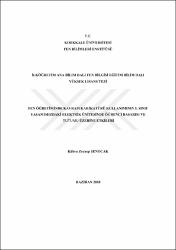Fen öğretiminde kavram karikatürü kullanımının 5. sınıf yaşamımızdaki elektrik ünitesinde öğrenci başarısı ve tutumu üzerine etkileri
Özet
ÖZET FEN ÖĞRETİMİNDE KAVRAM KARİKATÜRÜ KULLANIMININ 5. SINIF YAŞAMIMIZDAKİ ELEKTRİK ÜNİTESİNDE ÖĞRENCİ BAŞARISI VE TUTUMU ÜZERİNE ETKİLERİ ŞENOCAK, Kübra Zeynep Kırıkkale Üniversitesi Fen Bilimleri Enstitüsü İlköğretim Anabilim Dalı, Yüksek Lisans Tezi Danışman: Doç. Dr. Harun ÇELİK Haziran 2018, 118 sayfa Bu araştırmada fen öğretiminde kavram karikatürü kullanımının 5.sınıf "Yaşamımızdaki Elektrik" ünitesinde öğrenci başarısı ve tutumu üzerindeki etkileri incelenmiştir. Araştırma nicel ve nitel araştırmaların yer aldığı özel durum yöntemiyle yürütülmüştür. Nicel araştırmaların analizinde ön test ve son test gruplu yarı deneysel desen kullanılırken yarı yapılandırılmış görüşme sorularından oluşan nitel araştırmalarda içerik analizi yapılmıştır. Araştırma 2015-2016 öğretim yılında bir devlet ortaokulu 5. sınıfında öğrenim gören 40 öğrenci üzerinde gerçekleştirilmiştir. 21 öğrenci deney grubunu 19 öğrenci ise kontrol grubunu oluşturmuştur. Çalışma öğretim programının içeriğine uygun olarak 4 hafta, 16 ders saati ile sınırlıdır. Deney grubunda sınıf içi etkinlikler planlanırken mevcut öğretim programıyla birlikte kavram karikatürleri kullanılmıştır. Kontrol grubunda ise sadece mevcut öğretim programı doğrultusunda etkinlikler uygulanmıştır. Deney ve kontrol gurubundaki öğrencilere Fen Bilimleri dersine yönelik tutumlarını ölçmek için Şaşmaz-Ören (2005)' in geliştirdiği Fen Bilgisi dersi tutum ölçeği uygulanmıştır. Bir diğer veri toplama aracı olarak araştırmacı tarafından geliştirilen, uzman görüşüne dayalı ve KR-20 güvenirlik katsayısı 0.78 olarak hesaplanan, Blomm Taksonomisine göre her bir basamağa ait maddelerin olduğu toplamda 23 maddeden oluşan akademik başarı testi kullanılmıştır. Elde edilen veriler SPSS paket programı ile analiz edilmiştir. Çalışma sonuçları analiz edilirken non-parametrik analiz yöntemlerinden Mann Whitney U testi kullanılmıştır. Araştırmanın nitel sürecinde ise, deney grubundaki öğrencilere uygulamanın sonunda kavram karikatürleri hakkındaki düşüncelerini öğrenmek için yarı yapılandırılmış görüşme formu uygulanmıştır. Görüşmelerden elde edilen veriler içerik analizi yöntemiyle analiz edilmiştir. Yapılan analizler sonucunda deney ve kontrol grubu öğrencilerinin akademik başarı ve tutum ön-son test puanları arasında istatistiksel olarak anlamlı bir farklılık oluşmuştur. Bu sonuca göre kavram karikatürleriyle desteklenmiş mevcut program ile yapılan öğretimin sadece mevcut programa bağlı kalınarak yapılan öğretime göre akademik başarıyı arttırmada ve olumlu tutumlar geliştirmede etkili olduğu söylenebilir. Öğrenci görüşmelerinde öğrenciler; kavram karikatürleriyle işlenen dersin daha eğlenceli olmasının yanı sıra dersin öğrenme hızlarını arttırdığı ve kalıcı öğrenme sağlama fırsatı yakaladıklarını ifade etmişlerdir. Ayrıca diğer konuların ve derslerin içeriğinde kavram karikatürlerine yer verilmesi gerektiğine işaret edilmiştir. Bu çalışmanın sonucuna göre, ortaokul Fen Bilimleri dersinde kavram karikatürlerinin akademik başarıyı yükseltmek, dersi eğlenceli bir hale getirerek sevdirmek, öğrencilerin keyif alarak derse katılımını sağlamak, kavram öğrenimini kolaylaştırmak ve kalıcılığı artırmak açısından sıklıkla kullanılması gerektiği belirlenmiştir. ABSTRACT THE EFFECTS OF USING CONCEPT CARTOONS IN SCIENCE TEACHING ON THE STUDENT ATTITUDES AND THEIR ACADEMIC PERFORMANCES IN THE 5TH GRADE UNIT CALLED "ELECTRICITY IN OUR LIVES'' SENOCAK, Kübra Zeynep Kirikkale University Institute of Science and Technology The Department of Elemantary Education, Master's Thesis Supervisor: Assoc. Prof. Dr. Harun CELİK June, 2018, 118 page (s) In this research, the effects of using concept cartoons in the unit called "Electricity in Our Li" in teaching Science for the 5th grade students on the student attitudes and their academic performances have been investigated. The research has been carried out with "the particular case" method that includes qualitative and quantitative research. While the quasi-experimental design with a pretest-posttest group is used for the analysis of quantitative researches, the content analysis method has been used in qualitative researches that include semi-structured interview questions. The research has been carried out in 2015-2016 school year on 40 students in total. 21 of them have composed the experimental group and 19 of them have composed the control group. The study is limited to 16 course hours and 4 weeks in accordance with the content of curriculum. While the classroom activities have been planned, concept cartoons have been used with the existing curriculum for the experimental group. Only activities in the existing curriculum have been put into practice for the control group. An attitude scale developed for Science in 2015 by Şaşmaz-Ören has been applied in order to evaluate the attitudes of students both in the experimental and control groups towards Science. Another data collection tool has been the academic achievement test that is mainly based on expert opinion and its KR-20 reliability co-efficiency is calculated as 0.78 including 23 items in total according to Bloom's taxonomy. The data gained from the research have been analyzed with a softare package called SPSS (Statistical Package for the Social Sciences). Of all the non parametric methods, "Mann Whitney U Test" has been used for the analysis of the study results. A semi-structured interview form has been applied to find out what the students in the experimental group think about concept cartoons. The data collected from the interviews have been analyzed by means of the content analysis method. In the analyses carried out on the students both in experimental and control groups, a statistically significant difference has been found out between the students' academic performances and their pretest-posttest scores. In the light of this, it can be said that schooling is much more efficient in terms of raising academic achievement and having positive attitudes for learning than the existing curriculum if it is supported with concept cartoons. In the interviews done with the students, they have stated the lessons are more enjoyable thanks to concept cartoons and they have added that they simply find the opportunity of permanent learning. Also it has been pointed that concept cartoons should be included in the content of other subjects and units. According to the results of this study, it has been determined that concept cartoons must be frequently applied in order to raise academic achievement, make Science lessons fun and encourage students to participate in the classroom activities as well as making concept learning and learning persistence easier. Key Words: Concept cartoons, science teaching, the unit called Electricity in Our Lives, Academic Achievement, Attitude.
















